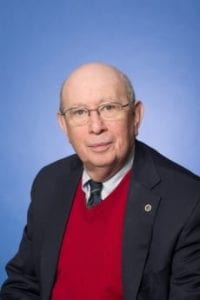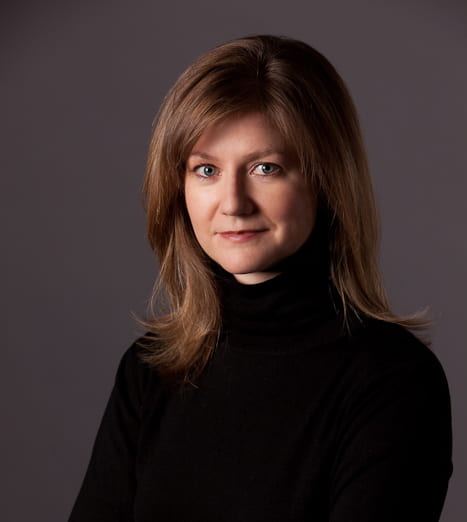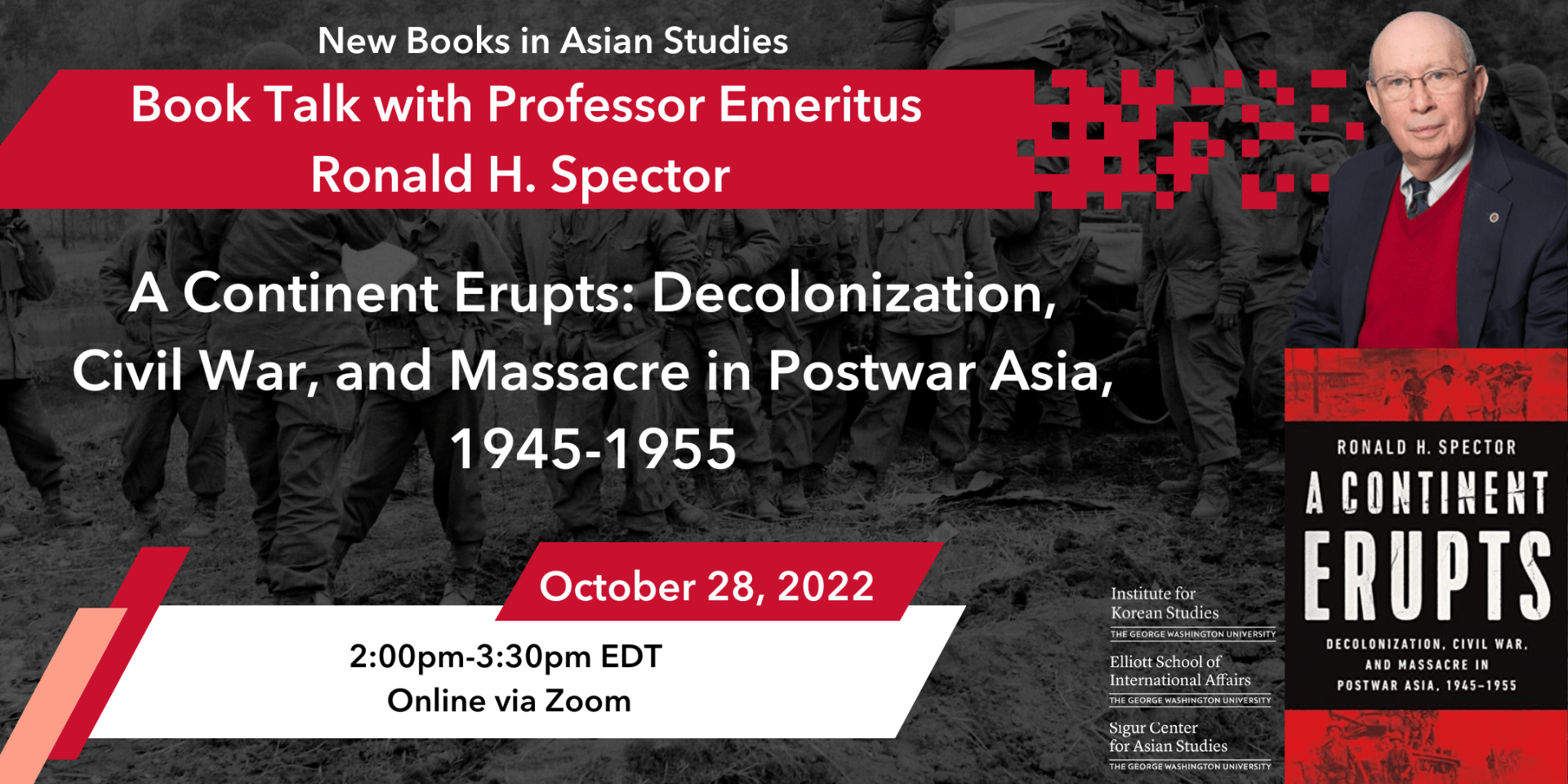Friday, October 28, 2022
2:00 PM – 3:30 PM EDT
Online via Zoom
As part of our New Books in Asia Series, the Sigur Center for Asian Studies will host a talk by Professor Emeritus of History and International Affairs, Ronald H. Spector about his new book A Continent Erupts: Decolonization, Civil War, and Massacre in Post-War Asia, 1945-1955. Sigur Center Director Gregg A. Brazinsky will moderate the event.
The end of World War II led to the United States’ emergence as a global superpower. For war-ravaged Western Europe it marked the beginning of decades of unprecedented cooperation and prosperity that one historian has labeled “the long peace.” Yet half a world away, in China, Indonesia, Vietnam, Korea, and Malaya—the fighting never really stopped, as these regions sought to completely sever the yoke of imperialism and colonialism with all-too-violent consequences.
East and Southeast Asia quickly became the most turbulent regions of the globe. Within weeks of the famous surrender ceremony aboard the U.S.S. Missouri, civil war, communal clashes, and insurgency engulfed the continent, from Southeast Asia to the Soviet border. By early 1947, full-scale wars were raging in China, Indonesia, and Vietnam, with growing guerrilla conflicts in Korea and Malaya. Within a decade after the Japanese surrender, almost all of the countries of South, East, and Southeast Asia that had formerly been conquests of the Japanese or colonies of the European powers experienced wars and upheavals that resulted in the deaths of at least 2.5 million combatants and millions of civilians.
With A Continent Erupts, acclaimed military historian Ronald H. Spector draws on letters, diaries, and international archives to provide, for the first time, a comprehensive military history and analysis of these little-known but decisive events. Far from being simply offshoots of the Cold War, as they have often been portrayed, these shockingly violent conflicts forever changed the shape of Asia, and the world as we know it today.
A Continent Erupts can be purchased from W. W. Norton. This event is free, on the record, and open to the public.
Speaker

Ronald H. Spector is an award-winning Professor Emeritus of History and International Affairs in the Elliott School of International Affairs at George Washington University. He received his B.A. from Johns Hopkins and his MA and Ph.D. from Yale. He is the author of seven books, including Eagle Against the Sun and In the Ruins of Empire.
He has served in various government positions and on active duty in the Marine Corps from 1967-69 and 1983-84, and was the first civilian to become Director of Naval History and the head of the Naval Historical Center. He has served on the faculties of LSU, Alabama, and Princeton and has been a senior Fulbright lecturer in India and Israel. In 1995-96 he was Distinguished Visiting Professor of Strategy at the National War College and was the Distinguished Guest Professor at Keio University, Tokyo in 2000.
Moderator

Gregg A. Brazinsky works on U.S.-East Asian relations and East Asian international history. He is interested in the flow of commerce, ideas, and culture among Asian countries and across the Pacific. He is proficient in Mandarin Chinese and Korean. He is the author of two books: Winning the Third World (2017), which focuses on Sino-American Rivalry in the Third World and Nation Building in South Korea (2007), which explores U.S.-South Korean relations during the Cold War. Currently, he is working on two other book projects. The first examines American nation-building in Asia during the Cold War. The second explores Sino-North Korean relations between 1949 and 1992 and focuses specifically on the development of cultural and economic ties between the two countries. He has received numerous fellowships to support his research including the Kluge Fellowship from the Library of Congress, the Smith Richardson Foundation junior faculty fellowship, and a fellowship from the Woodrow Wilson Center. Professor Brazinsky also currently serves as the director of the George Washington Cold War Group.
As director of the Asian Studies Program, Professor Brazinsky has attracted some of the brightest students from around the country and the world who share a commitment to pursuing careers related to Asia. He helped to launch a special mentoring program for Asian Studies MA students and has worked to expand fellowship and professional opportunities for students in the program.
Opening Remarks

Alyssa Ayres was appointed dean of the Elliott School of International Affairs and professor of history and international affairs at George Washington University effective February 1, 2021. She is the first woman to serve in the role of permanent dean at the school. Ayres is a foreign policy practitioner and award-winning author with senior experience in the government, nonprofit, and private sectors. From 2013 to 2021, she was senior fellow for India, Pakistan, and South Asia at the Council on Foreign Relations (CFR), where she remains an adjunct senior fellow.
Her work focuses primarily on India’s role in the world and on U.S. relations with South Asia in the larger Indo-Pacific. Her book about India’s rise on the world stage, Our Time Has Come: How India is Making Its Place in the World, was published by Oxford University Press in January 2018 and was selected by the Financial Times for its “Summer 2018: Politics” list. An updated paperback edition was released in 2019. Ayres is also interested in the emergence of subnational engagement in foreign policy, particularly the growth of international city networks, and her current book project (working title, “Bright Lights, Biggest Cities: The Urban Challenge to India’s Future,” under contract with Oxford University Press) examines India’s urban transformation and its international implications.
From 2010 to 2013 Ayres served as deputy assistant secretary of state for South Asia. During her tenure at the State Department in the Barack Obama administration, she covered all issues across a dynamic region of 1.3 billion people at the time (Bangladesh, Bhutan, India, Maldives, Nepal, and Sri Lanka) and provided policy direction for four U.S. embassies and four consulates. Before serving in the Obama administration, Ayres was founding director of the India and South Asia practice at McLarty Associates, the Washington-based international strategic advisory firm, from 2008 to 2010, and served as a part-time senior advisor to the firm from 2014 to 2021. From 2007 to 2008, she served as special assistant to the undersecretary of state for political affairs as a CFR international affairs fellow. Prior to that she worked at the University of Pennsylvania’s Center for the Advanced Study of India and at the Asia Society in New York.
Originally trained as a cultural historian, Ayres has carried out research on both India and Pakistan. Her book on nationalism, culture, and politics in Pakistan, Speaking Like a State, was published worldwide by Cambridge University Press in 2009 and received an American Institute of Pakistan Studies book prize for 2011–2012. She has coedited three books on India and Indian foreign policy: Power Realignments in Asia; India Briefing: Takeoff at Last?; and India Briefing: Quickening the Pace of Change.
Ayres has been awarded numerous fellowships and has received four group or individual Superior Honor Awards for her work at the State Department. She speaks Hindi and Urdu, and in the mid-1990s worked as an interpreter for the International Committee of the Red Cross. She received an AB from Harvard College and an MA and PhD from the University of Chicago. She is a life member of the Council on Foreign Relations, the Trilateral Commission, a member of the Halifax International Security Forum’s agenda working group, and a member of the Women’s Foreign Policy Group board of directors. In 2021 and 2022, the Washingtonian included her as one of their “most influential people shaping policy.”





